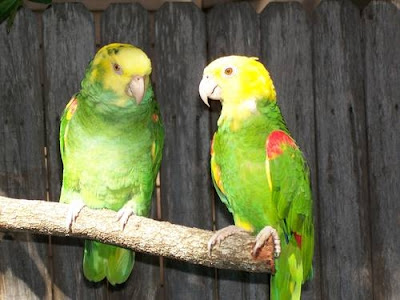Problems With Keeping More Than One Bird In A Cage
Problems With Keeping More Than One Bird In A Cage
I love cockatiels. So much. They are the sweetest, funniest, most agreeable and easy to read birds I have ever had or known. I hope to always have them in my life, so much so that I have to purposely avoid any I see at a bird store because I don’t trust myself to say no.
At this date, only two remain from my original flock of four cockatiels which were all housed in one large cage. While keeping those birds together, I learned the hard way about the problems that can arise from putting multiple birds in a single cage.
Which droppings belong to whom?
Birds are masters at hiding illnesses from us. Wild birds understand that opportunistic predators target the smallest and weakest of a flock first, and because this thinking is hardwired into all parrots, ours included, they keep their physical condition private until they are too ill to hide it any longer.
Along with changes in weight, droppings are one of the only ways to observe the health of your bird. These are the two symptoms not within their power to cover up and I have always relied heavily on their droppings to tell me what I need to know.
When you keep more than one bird in a cage, you don’t know who is responsible for which dropping. In this case, it is very important that you frequently weigh each bird. This practice will be your last line of defense in spotting an illness before it becomes serious.
Who is NOT eating their food?
Even when you put out a bowl of food for each bird, there is not telling who is eating what without watching (or filming). It goes without saying that the birds will eat their favorite foods first. I have no problem with this because my birds always get around to eating the lesser preferred foods every day. I don’t care about order. But I do care when one bird eats all of his corn and then bullies his way to the other bowl and eats all of the corn there too. I possibly have one bird that is filled up on only corn. I have no idea who is eating how much of what.
If you question whether all of your birds is eating properly, feed them separately. I keep extra small wire cages available for the trips to the vet and for times when I want to separate the cockatiels who sometimes act like grumpy old men and get on each other’s nerves. Or when I want to see exactly what one or the other of them is eating.
Who is ruling the roost and are they tyrannical?
Speaking of bullying, it is not uncommon for one of the birds you have caged together to come into power over their cage mates. This is not usually the result of an election. Having a leader is fine, but if that leader prevents others from eating, by using either physical force or intimidation, it is not only uncool misuse of power, it is unhealthy and unsafe for the other birds. Sometimes one bird is mercilessly picked on by the other birds for reasons we may not understand.
When there is discord among multiple caged birds, you have to step in for safety reasons. If harassment were to escalate to violence, the bullied bird would have no means of escape in a closed cage. This is the time to separate the birds, perhaps by removing the bullied bird or by grouping them differently into two more cages containing birds with similar temperaments.
I think it is a good idea to move the bullied bird to a cage alone for a bit while you assess its health. Sometimes caged birds do not single out a bird to pick on for personal reasons, it might be an indication of their poor health. In the wild, once a bird is visibly ill, it is run off by its flockmates because it is a target for predators and will jeopardize the well-being of the entire flock. Not very nice, I know, but necessary for the greater good.
Which of the birds is Typhoid Mary?
Most bird contagious bird diseases are spread through body fluids and feces. This means if one of your birds gets sick, ALL of them will get sick. Don’t even waste your time guessing which bird is the one with the watery, smelly droppings. Even if you separate the birds at this point, the ones that still appear healthy probably have the bacterial infection as well.
When you go to the vet, be very sure to tell them that this bird is housed with multiple others. Be honest about their conditions and housing, and when/if you are given general antibiotics for ALL of the birds, be SURE your administer it to ALL of the birds. If you miss one, the entire flock can become reinfected. Bad for the birds, bad for the wallet.
Having all the birds in one cage is convenient for us when it comes to cleaning and space issues in the house, but it can be problematic if you aren’t aware of potential problems







Comments
Post a Comment